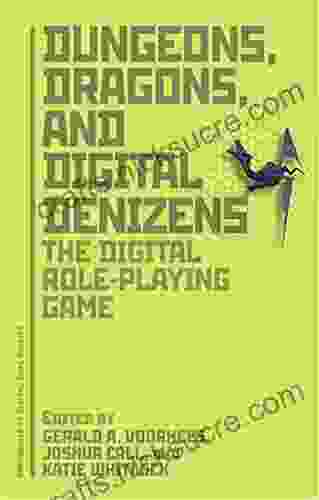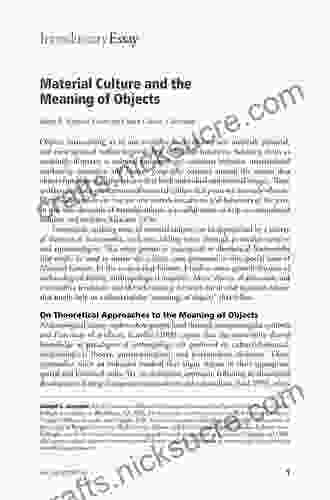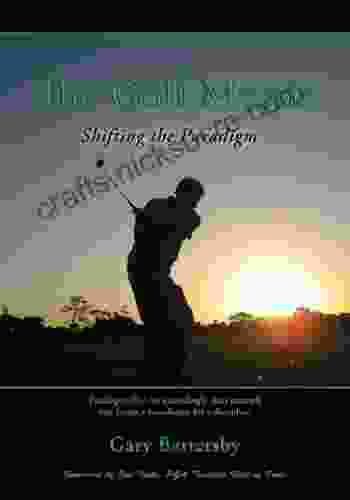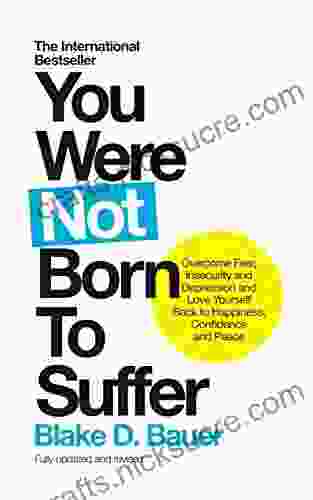Inside the Revolutionary Science of Our Ancient Maternal Instinct

The bond between a mother and her child is a timeless connection, a primal instinct that has shaped human society since the dawn of time. Yet, despite its profound significance, the science behind this maternal instinct has remained shrouded in mystery. Until now.
In this comprehensive article, we'll delve into the fascinating realm of the maternal instinct, exploring its neurological foundations, evolutionary roots, and the transformative impact it has on our lives as mothers and individuals.
Recent scientific advancements have shed light on the neurobiological underpinnings of the maternal instinct. It's a complex symphony of hormones and brain structures, working in concert to orchestrate the nurturing behaviors that sustain our offspring.
4.4 out of 5
| Language | : | English |
| File size | : | 2802 KB |
| Text-to-Speech | : | Enabled |
| Screen Reader | : | Supported |
| Enhanced typesetting | : | Enabled |
| X-Ray | : | Enabled |
| Word Wise | : | Enabled |
| Print length | : | 325 pages |
Oxytocin: The Love Hormone
Oxytocin, often referred to as the "love hormone," plays a crucial role in maternal behavior. It surges during childbirth and breastfeeding, promoting bonding and attachment. Oxytocin also reduces stress and increases empathy, enhancing the mother's ability to respond to her child's emotional needs.
Dopamine: The Reward Pathway
The neurotransmitter dopamine is released when a mother engages in nurturing activities, such as holding or feeding her baby. This release triggers a sense of pleasure and satisfaction, reinforcing the maternal instinct and motivating continued caregiving.
Vasopressin: The Attachment Hormone
Vasopressin, another hormone involved in maternal behavior, is associated with bonding and pair bonding. It supports the formation of strong emotional attachments between the mother and her child, fostering a secure and nurturing environment.
The maternal instinct has evolved over millions of years, driven by the imperative of protecting and nurturing offspring to ensure the survival of the species.
Natural Selection and Offspring Protection
Natural selection has favored individuals with strong maternal instincts, as those who failed to protect and care for their young were less likely to pass on their genes. This evolutionary force has ingrained the maternal instinct into our biological makeup, ensuring the continuation of our lineage.
Culture and Nurture: Adapting to Changing Environments
While the maternal instinct is hardwired into our neurobiology, it's also shaped by cultural and environmental factors. Different societies have varying expectations and norms regarding motherhood, influencing how mothers express their instincts and fulfill their roles.
Motherhood is not merely a biological function; it's a transformative experience that profoundly alters a woman's life.
Identity Redefined: The Journey of Self-Discovery
Becoming a mother often leads to a profound redefinition of identity. Women discover new strengths and capabilities, embracing the challenges and joys of nurturing another human being. Motherhood provides a unique opportunity for personal growth and self-acceptance.
Emotional Intelligence: Nurturing Empathy and Resilience
The demands of motherhood require mothers to develop heightened emotional intelligence. They learn to attune to the emotions of their children, empathize with their perspectives, and respond with compassion. This enhanced emotional awareness extends beyond the parent-child relationship, fostering healthier and more fulfilling personal interactions.
Selfless Love: A Boundless Capacity for Caring
Motherhood evokes a selfless love that transcends biological ties. It's a love that is unconditional, enduring, and unwavering. This profound bond nourishes children's emotional and psychological well-being, fostering their resilience and shaping their future relationships.
As we deepen our understanding of the maternal instinct, it's essential to promote and support its expression in society.
Social and Policy Supports: Empowering Mothers
Government policies and community initiatives that support maternal health, education, and childcare empower mothers to fulfill their nurturing potential. Paid parental leave, affordable childcare, and access to healthcare are essential investments in both mothers and children.
Community and Family Bonds: Strengthening Connections
Nurturing the maternal instinct requires a supportive social network. Family, friends, and community members can provide invaluable assistance with childcare, emotional support, and a sense of belonging, reducing stress and fostering the well-being of both mothers and children.
Cultural Sensitivity: Respecting Diverse Maternal Expressions
Cultural diversity influences the expression of the maternal instinct. Respecting and embracing different cultural perspectives and parenting styles promotes inclusivity and allows mothers to nurture their children in ways that align with their values and traditions.
The maternal instinct is an ancient and profound force that has guided and nurtured human society for millennia. By unraveling its scientific foundations, we gain a deeper appreciation for the transformative power of motherhood.
Supporting and empowering mothers is an investment in the well-being of future generations. By fostering a society that values and celebrates the maternal instinct, we create a world where all children thrive and all mothers flourish.
As we continue to explore the uncharted depths of this evolutionary inheritance, we honor the enduring bond between mothers and children, recognizing that its influence extends far beyond the nursery and shapes the very fabric of our humanity.
4.4 out of 5
| Language | : | English |
| File size | : | 2802 KB |
| Text-to-Speech | : | Enabled |
| Screen Reader | : | Supported |
| Enhanced typesetting | : | Enabled |
| X-Ray | : | Enabled |
| Word Wise | : | Enabled |
| Print length | : | 325 pages |
Do you want to contribute by writing guest posts on this blog?
Please contact us and send us a resume of previous articles that you have written.
 Fiction
Fiction Non Fiction
Non Fiction Romance
Romance Mystery
Mystery Thriller
Thriller SciFi
SciFi Fantasy
Fantasy Horror
Horror Biography
Biography Selfhelp
Selfhelp Business
Business History
History Classics
Classics Poetry
Poetry Childrens
Childrens Young Adult
Young Adult Educational
Educational Cooking
Cooking Travel
Travel Lifestyle
Lifestyle Spirituality
Spirituality Health
Health Fitness
Fitness Technology
Technology Science
Science Arts
Arts Crafts
Crafts DIY
DIY Gardening
Gardening Petcare
Petcare Phil Gaimon
Phil Gaimon Adam J Cox
Adam J Cox Achusim Michael
Achusim Michael Monica Sorrenson
Monica Sorrenson Chris Jericho
Chris Jericho Jacob Neumann
Jacob Neumann Darrin Bergman
Darrin Bergman Ariana Eagleton
Ariana Eagleton Christina Hoff Sommers
Christina Hoff Sommers Deborah Madison
Deborah Madison Chiara Giuliani
Chiara Giuliani Ilsa J Bick
Ilsa J Bick Tom Mccarthy
Tom Mccarthy Jennifer Ackerman
Jennifer Ackerman Debbie Elicksen
Debbie Elicksen Abbey Curran
Abbey Curran Aaron Reed Msn Crna
Aaron Reed Msn Crna Barry Dainton
Barry Dainton Tim Larkin
Tim Larkin Jeremy Miles
Jeremy Miles Terry Palechuk
Terry Palechuk G Bailey
G Bailey Sophie Mccartney
Sophie Mccartney Chuck Callaway
Chuck Callaway Douglas W Hubbard
Douglas W Hubbard Lavinia Collins
Lavinia Collins Marlene Wagman Geller
Marlene Wagman Geller O Thomas Gift
O Thomas Gift Abigail Hair
Abigail Hair Kemi Iwalesin
Kemi Iwalesin Craig Timberg
Craig Timberg Stephen A Mitchell
Stephen A Mitchell Chashiree M
Chashiree M Kate Rope
Kate Rope Vikas Kakwani
Vikas Kakwani Phong Thong Dang
Phong Thong Dang Charles C Patrick
Charles C Patrick Bill Mckibben
Bill Mckibben Scott Parsons
Scott Parsons Jennifer Shannon
Jennifer Shannon T L Christianson
T L Christianson Lee Sandlin
Lee Sandlin Ed Engle
Ed Engle Amby Burfoot
Amby Burfoot Mikki Daughtry
Mikki Daughtry Pamela Druckerman
Pamela Druckerman Steve Mcmenamin
Steve Mcmenamin Christian Beamish
Christian Beamish Adam Galinsky
Adam Galinsky Baba Ifa Karade
Baba Ifa Karade Kim Gosselin
Kim Gosselin David Lipsky
David Lipsky Brandon Neice
Brandon Neice Aaron Mahnke
Aaron Mahnke Ada Calhoun
Ada Calhoun Jasna Tuta
Jasna Tuta Alicia Silverstone
Alicia Silverstone Israel Finkelstein
Israel Finkelstein Lisa Pineda
Lisa Pineda Pat Chargot
Pat Chargot Rachael Ray
Rachael Ray Christopher Pike
Christopher Pike Mark Strom
Mark Strom Sean Mcmanus
Sean Mcmanus Sherri Granato
Sherri Granato Lindsey Ellison
Lindsey Ellison Uri Bram
Uri Bram Chris Worfolk
Chris Worfolk Jessie Hartland
Jessie Hartland Rory Miller
Rory Miller Gerry Donohue
Gerry Donohue Hillary Allen
Hillary Allen Jeff Bauman
Jeff Bauman Adam Becker
Adam Becker Roman Dial
Roman Dial Brian L Gorman
Brian L Gorman Achref Hassini
Achref Hassini Hans C Ohanian
Hans C Ohanian Ron Hotchkiss
Ron Hotchkiss Tomi Adeyemi
Tomi Adeyemi Gail Buckland
Gail Buckland Liza Angela
Liza Angela Jack Cavanaugh
Jack Cavanaugh Lisa M Given
Lisa M Given Emily J Taylor
Emily J Taylor Lucy Letcher
Lucy Letcher Xiuhtezcatl Martinez
Xiuhtezcatl Martinez Alvin Alexander
Alvin Alexander Debbie Ford
Debbie Ford Stephen Gray
Stephen Gray Michael Egan
Michael Egan Lillian Cumic
Lillian Cumic Vivienne Sanders
Vivienne Sanders Devika Primic
Devika Primic Abigail Melton
Abigail Melton Goodman Publishing
Goodman Publishing Sam Jarman
Sam Jarman Abdelkader Nouiri
Abdelkader Nouiri Emily Suzanne Clark
Emily Suzanne Clark Randy Walker
Randy Walker Charles Thomas Jr
Charles Thomas Jr Moon Ho Jung
Moon Ho Jung Abbi Glines
Abbi Glines Axie Oh
Axie Oh Gavin D J Harper
Gavin D J Harper Caroline Kaufman
Caroline Kaufman David Warriner
David Warriner Charles Fernyhough
Charles Fernyhough Helen C Rountree
Helen C Rountree Alexander Nehamas
Alexander Nehamas Aaron Oster
Aaron Oster Lisa Heffernan
Lisa Heffernan Alan Robertson
Alan Robertson Cosmas Inyang
Cosmas Inyang Christopher Knight
Christopher Knight Tony Soper
Tony Soper Dan Shideler
Dan Shideler Marc Dando
Marc Dando Erika Fatland
Erika Fatland Lynn Rush
Lynn Rush Man Kam Lo
Man Kam Lo Felice Fox
Felice Fox Corinne Andrews
Corinne Andrews Steve Roper
Steve Roper Ian Mcleod
Ian Mcleod Tomos Forrest
Tomos Forrest James Surowiecki
James Surowiecki Paul Schneider
Paul Schneider Paul Chiasson
Paul Chiasson Conrad Bauer
Conrad Bauer Jennifer Greene
Jennifer Greene Arthur Turrell
Arthur Turrell Aaron Reed
Aaron Reed Claire Santry
Claire Santry Matt Owens
Matt Owens Neil Oliver
Neil Oliver Abigail Marshall
Abigail Marshall Michel Roy
Michel Roy Barbara Decker
Barbara Decker Abraham Silberschatz
Abraham Silberschatz Kathy Koch Phd
Kathy Koch Phd Paul Mclerran
Paul Mclerran Sheila Lamb
Sheila Lamb Kit Bauman
Kit Bauman Brian Hoggard
Brian Hoggard Joy Neighbors
Joy Neighbors David Simon
David Simon David G Brown
David G Brown Elisabetta Viggiani
Elisabetta Viggiani Linda Sarris
Linda Sarris Randi Hutter Epstein
Randi Hutter Epstein Aaron Lee Johnson
Aaron Lee Johnson Ralph Villiger
Ralph Villiger Sean Lewis
Sean Lewis Bruce Van Brunt
Bruce Van Brunt Maxine Levaren
Maxine Levaren Lynn Alley
Lynn Alley Brigitte Jordan
Brigitte Jordan Aaron Hahn
Aaron Hahn Aiden Thomas
Aiden Thomas Sheldon Axler
Sheldon Axler Curt Lader
Curt Lader Aaron Graves
Aaron Graves Brian Greene
Brian Greene Achim K Krull
Achim K Krull Fred Fields
Fred Fields Brad Brewer
Brad Brewer Drew Harris
Drew Harris Natasha Preston
Natasha Preston Winifred Conkling
Winifred Conkling Adam Benshea
Adam Benshea Adam Freeman
Adam Freeman Gisle Solhaug
Gisle Solhaug Iain Highfield
Iain Highfield Jeremy Roenick
Jeremy Roenick Laurie Chaikind Mcnulty Lcsw C
Laurie Chaikind Mcnulty Lcsw C Shari Eskenas
Shari Eskenas Ned Johnson
Ned Johnson Lisa M Schab
Lisa M Schab Stacy Eaton
Stacy Eaton Sarah Luddington
Sarah Luddington Collins Kids
Collins Kids Adam Braus
Adam Braus John Taylor
John Taylor Al Baird
Al Baird Jeremy Paxman
Jeremy Paxman Abby Hafer
Abby Hafer Benjamin Roberts
Benjamin Roberts Abigail Pogrebin
Abigail Pogrebin Jon Butterworth
Jon Butterworth Adam J Rosh
Adam J Rosh Peter Harrison
Peter Harrison Robert Fritz
Robert Fritz Abigail Tucker
Abigail Tucker Maya Lang
Maya Lang Irene Lewis Mccormick
Irene Lewis Mccormick Stephen Abbott
Stephen Abbott Richelle Mead
Richelle Mead Teresa Finney
Teresa Finney Winston Chang
Winston Chang Asato Asato
Asato Asato Abdul Foster
Abdul Foster Anthony Wilkenson
Anthony Wilkenson Eze Ugbor
Eze Ugbor Zoe Hamlet Silva
Zoe Hamlet Silva J Robert King
J Robert King Amber Domoradzki
Amber Domoradzki Sharon Boyd
Sharon Boyd Cassandra Eason
Cassandra Eason Daniel Carter Beard
Daniel Carter Beard Tom Jackson
Tom Jackson Richard Sattora
Richard Sattora Dick Edie
Dick Edie Rolf Mowatt Larssen
Rolf Mowatt Larssen T L Lowery
T L Lowery Tali Edut
Tali Edut Abigail Alling
Abigail Alling Laura Ray
Laura Ray Sheri Van Dijk
Sheri Van Dijk Marie Cirano
Marie Cirano Andrew Skurka
Andrew Skurka Al Desetta
Al Desetta Abridged Ed Edition Kindle Edition
Abridged Ed Edition Kindle Edition Peter David
Peter David Katrina Kahler
Katrina Kahler Lucio Russo
Lucio Russo Al Barkow
Al Barkow Miranda Kenneally
Miranda Kenneally Annie Nicholas
Annie Nicholas Richard Langer
Richard Langer Aaron Mccargo
Aaron Mccargo Dawson Church
Dawson Church Al Yellon
Al Yellon Alifya And Umesh Mohite
Alifya And Umesh Mohite Susan Walton
Susan Walton Jay Dawes
Jay Dawes Joe Simpson
Joe Simpson Mary Roach
Mary Roach Seth Kugel
Seth Kugel Phil Boyle
Phil Boyle Michael N Mitchell
Michael N Mitchell Allan Sand
Allan Sand Scott Butler
Scott Butler Dr Robert Pasahow
Dr Robert Pasahow Emily K Neuburger
Emily K Neuburger Wayne Westcott
Wayne Westcott Abu Mussab Wajdi Akkari
Abu Mussab Wajdi Akkari Stephen R Lawhead
Stephen R Lawhead Rachel Caine
Rachel Caine Jennifer L Hunt
Jennifer L Hunt John Hancock
John Hancock Sasha Abramsky
Sasha Abramsky John Caig
John Caig Pearson Education
Pearson Education Charles L Byrne
Charles L Byrne Edward J Larson
Edward J Larson Arthur Atchabahian
Arthur Atchabahian Erik Scott De Bie
Erik Scott De Bie Jessica Hepburn
Jessica Hepburn Amber Fox
Amber Fox Adam H Balen
Adam H Balen M J Parisian
M J Parisian P S Page
P S Page Carl Vernon
Carl Vernon Louise Pickford
Louise Pickford Richard Martin
Richard Martin Matt Warshaw
Matt Warshaw Christopher Monahan
Christopher Monahan Rex Ogle
Rex Ogle Meg Keys
Meg Keys Claire Ahn
Claire Ahn Michael Gruenbaum
Michael Gruenbaum Vince Kotchian
Vince Kotchian Cornel West
Cornel West Kel Carpenter
Kel Carpenter Ben Cohen
Ben Cohen Jimmy Houston
Jimmy Houston Aliza Green
Aliza Green Katie Lear
Katie Lear Christophe Jaffrelot
Christophe Jaffrelot Abby Mcallister
Abby Mcallister Charles H Kraft
Charles H Kraft Bathroom Readers Institute
Bathroom Readers Institute Randall Hyde
Randall Hyde Todd Graves
Todd Graves Marvin Valerie Georgia
Marvin Valerie Georgia Stuart Firestein
Stuart Firestein Adam Chandler
Adam Chandler Carl Jones
Carl Jones Garo Yepremian
Garo Yepremian Barry Robinson
Barry Robinson Beth Newell
Beth Newell George J Hademenos
George J Hademenos Ann Frederick
Ann Frederick Martha C Nussbaum
Martha C Nussbaum Barbara Natterson Horowitz
Barbara Natterson Horowitz Rose Ann Hudson
Rose Ann Hudson Michelle Hodkin
Michelle Hodkin Steve Rosenberg
Steve Rosenberg Kayla Cottingham
Kayla Cottingham Andy Dumas
Andy Dumas Chaz Scoggins
Chaz Scoggins Helen Scales
Helen Scales Abinash Das
Abinash Das Virginia Smith Harvey
Virginia Smith Harvey Kenn Kaufman
Kenn Kaufman Gil Capps
Gil Capps Ron Jones
Ron Jones Richard Lighthouse
Richard Lighthouse Tim Jarvis
Tim Jarvis Jane Gross
Jane Gross William Hamilton Gibson
William Hamilton Gibson Gary Sakuma
Gary Sakuma Michelle Obama
Michelle Obama Reinette Biggs
Reinette Biggs Dan Morris
Dan Morris Emma Crewe
Emma Crewe Adam Lashinsky
Adam Lashinsky R L Stine
R L Stine Tamora Pierce
Tamora Pierce Irakli Makharadze
Irakli Makharadze Jim Willis
Jim Willis Susan Zeppieri
Susan Zeppieri Aaron J Perry
Aaron J Perry Andy Couturier
Andy Couturier Walter Browder
Walter Browder David Feddes
David Feddes Gregor Clark
Gregor Clark Ian Davis
Ian Davis Gayle Forman
Gayle Forman Jeremy Shinewald
Jeremy Shinewald Jack Moore
Jack Moore Charlie Barker
Charlie Barker Ken Retallic
Ken Retallic Linford Stutzman
Linford Stutzman Abigail Owen
Abigail Owen Kevin A Morrison
Kevin A Morrison George John Romanes
George John Romanes Achille Rubini
Achille Rubini Carmen Moreno
Carmen Moreno Carley Roney
Carley Roney Dan Werb
Dan Werb Daphne Poltz
Daphne Poltz Thubten Yeshe
Thubten Yeshe Maureen Duffin Ward
Maureen Duffin Ward Adam Enaz
Adam Enaz Adam Frank
Adam Frank Barbara Fox
Barbara Fox Lois G Schwoerer
Lois G Schwoerer Adam Lazarus
Adam Lazarus Peter Sagal
Peter Sagal Judi Kesselman Turkel
Judi Kesselman Turkel Laura Gao
Laura Gao Abigail Hing Wen
Abigail Hing Wen Larry Carpenter
Larry Carpenter Steven Alan Childress
Steven Alan Childress David Winner
David Winner Steve Griffith
Steve Griffith Sorin Dumitrascu
Sorin Dumitrascu Laurence Steinberg
Laurence Steinberg An American Citizen
An American Citizen Abby Haight
Abby Haight Renda Dionne Madrigal
Renda Dionne Madrigal Alicia C Simpson
Alicia C Simpson Jay Ruud
Jay Ruud Adam Kimelman
Adam Kimelman Christopher Black
Christopher Black Rania Abouzeid
Rania Abouzeid Scott Shaw
Scott Shaw Barbara A Lewis
Barbara A Lewis Lisa Latimer
Lisa Latimer Robert Allans
Robert Allans Glen Finland
Glen Finland Sam J Miller
Sam J Miller Melodie M Davis
Melodie M Davis Deborah Beck Busis
Deborah Beck Busis Abbas Kazerooni
Abbas Kazerooni Bobby Reyes
Bobby Reyes Sissy Goff
Sissy Goff Scott Carney
Scott Carney Blake D Bauer
Blake D Bauer Michael Crawley
Michael Crawley Chella Quint
Chella Quint Gladys Chepkirui Ngetich
Gladys Chepkirui Ngetich Mark Januszewski
Mark Januszewski Miriam Forman Brunell
Miriam Forman Brunell Christopher S Stewart
Christopher S Stewart Ronald Kaine
Ronald Kaine Sarah K L Wilson
Sarah K L Wilson John Kean
John Kean Laura Sebastian
Laura Sebastian Abhishek V R
Abhishek V R Agustin Fuentes
Agustin Fuentes Stefan Ball
Stefan Ball Aaron James
Aaron James Betsy Miller
Betsy Miller Robert Reid
Robert Reid Heather Lynn
Heather Lynn Catherine Ryan Hyde
Catherine Ryan Hyde Leigh Bardugo
Leigh Bardugo Og Mandino
Og Mandino Michael L Bloomquist
Michael L Bloomquist Papus
Papus Kristin Berry
Kristin Berry Vivian Gussin Paley
Vivian Gussin Paley Scott Meyers
Scott Meyers Suzanne Corkin
Suzanne Corkin Eugene H Merrill
Eugene H Merrill Rob Gray
Rob Gray Paula Deen
Paula Deen Amelia Whitmore
Amelia Whitmore Lenyfer Garrido
Lenyfer Garrido James Heberd
James Heberd Clara Shaper
Clara Shaper Norton Juster
Norton Juster Timothy Phelps
Timothy Phelps Ryan Smithson
Ryan Smithson Ann Mariah Cook
Ann Mariah Cook Sarah Maslin Nir
Sarah Maslin Nir Horace Kephart
Horace Kephart Adam D Scott
Adam D Scott Domenica Marchetti
Domenica Marchetti William Deresiewicz
William Deresiewicz Tom Rosenbauer
Tom Rosenbauer Andrew Campanella
Andrew Campanella Gerald A Voorhees
Gerald A Voorhees Eduardo Duran
Eduardo Duran Martha Gellhorn
Martha Gellhorn Adam Boduch
Adam Boduch Casey Robson
Casey Robson Colin Hunter
Colin Hunter Carolyn Jessop
Carolyn Jessop Taylan Hoca
Taylan Hoca Farah Shabazz Ii
Farah Shabazz Ii Louise Thaden
Louise Thaden Fumio Sasaki
Fumio Sasaki Michael Johnson
Michael Johnson Thomas Wilson
Thomas Wilson Adam Koch
Adam Koch Shuai Huang
Shuai Huang Nancy Mohrbacher
Nancy Mohrbacher Genius Reads
Genius Reads Bill Loguidice
Bill Loguidice Stephanie Puglisi
Stephanie Puglisi John D Gordon
John D Gordon Jason Korol
Jason Korol Ken Springer
Ken Springer Rick Sekuloski
Rick Sekuloski Mary Wong
Mary Wong Garrett Mcnamara
Garrett Mcnamara Shannon Hale
Shannon Hale Lynn E Ponton
Lynn E Ponton Sally Clarkson
Sally Clarkson Lin Wellford
Lin Wellford Aaron Blight
Aaron Blight Jenny Han
Jenny Han Kirk Bailey
Kirk Bailey Programming Languages Academy
Programming Languages Academy Zoyla Arana
Zoyla Arana Kaylynn Flanders
Kaylynn Flanders Sarah Moore
Sarah Moore E P Marcellin
E P Marcellin Dmv Test Bank
Dmv Test Bank Abby Sunderland
Abby Sunderland Harley Rustad
Harley Rustad Stephen Brennan
Stephen Brennan Nick Holt
Nick Holt Megan Lane
Megan Lane Jim Morekis
Jim Morekis Andrea M Nelson Royes
Andrea M Nelson Royes David Rensin
David Rensin Laura Peyton Roberts
Laura Peyton Roberts Justin Driver
Justin Driver Gloria Atanmo
Gloria Atanmo Lisa Robertson
Lisa Robertson Rosie Pope
Rosie Pope Elena Aguilar
Elena Aguilar Stephanie Zeiss
Stephanie Zeiss Michael Baigent
Michael Baigent Tom Migdalski
Tom Migdalski Jennifer Finney Boylan
Jennifer Finney Boylan
Light bulbAdvertise smarter! Our strategic ad space ensures maximum exposure. Reserve your spot today!
 Sammy PowellFollow ·11.7k
Sammy PowellFollow ·11.7k Jorge Luis BorgesFollow ·4.9k
Jorge Luis BorgesFollow ·4.9k Michael SimmonsFollow ·19.5k
Michael SimmonsFollow ·19.5k Mario SimmonsFollow ·4.7k
Mario SimmonsFollow ·4.7k T.S. EliotFollow ·4.8k
T.S. EliotFollow ·4.8k Scott ParkerFollow ·13.2k
Scott ParkerFollow ·13.2k August HayesFollow ·5.9k
August HayesFollow ·5.9k Austin FordFollow ·17.5k
Austin FordFollow ·17.5k

 Doug Price
Doug PriceTracing the Evolution of Modern Psychoanalytic Thought:...
Psychoanalysis, once considered a radical...

 Devin Ross
Devin RossThe Digital Role Playing Game Approaches To Digital Game...
These are just a few of the many...

 F. Scott Fitzgerald
F. Scott FitzgeraldHistory from Things: Essays on Material Culture
History from Things:...

 Percy Bysshe Shelley
Percy Bysshe ShelleyThe Priest Lake Girl and the Cabin of Love: A True Story...
The Murder On...

 Isaiah Powell
Isaiah PowellThe Golf Mystic: Dick Edie's Unconventional Approach to...
In the annals of golf history, the name Dick...
4.4 out of 5
| Language | : | English |
| File size | : | 2802 KB |
| Text-to-Speech | : | Enabled |
| Screen Reader | : | Supported |
| Enhanced typesetting | : | Enabled |
| X-Ray | : | Enabled |
| Word Wise | : | Enabled |
| Print length | : | 325 pages |














